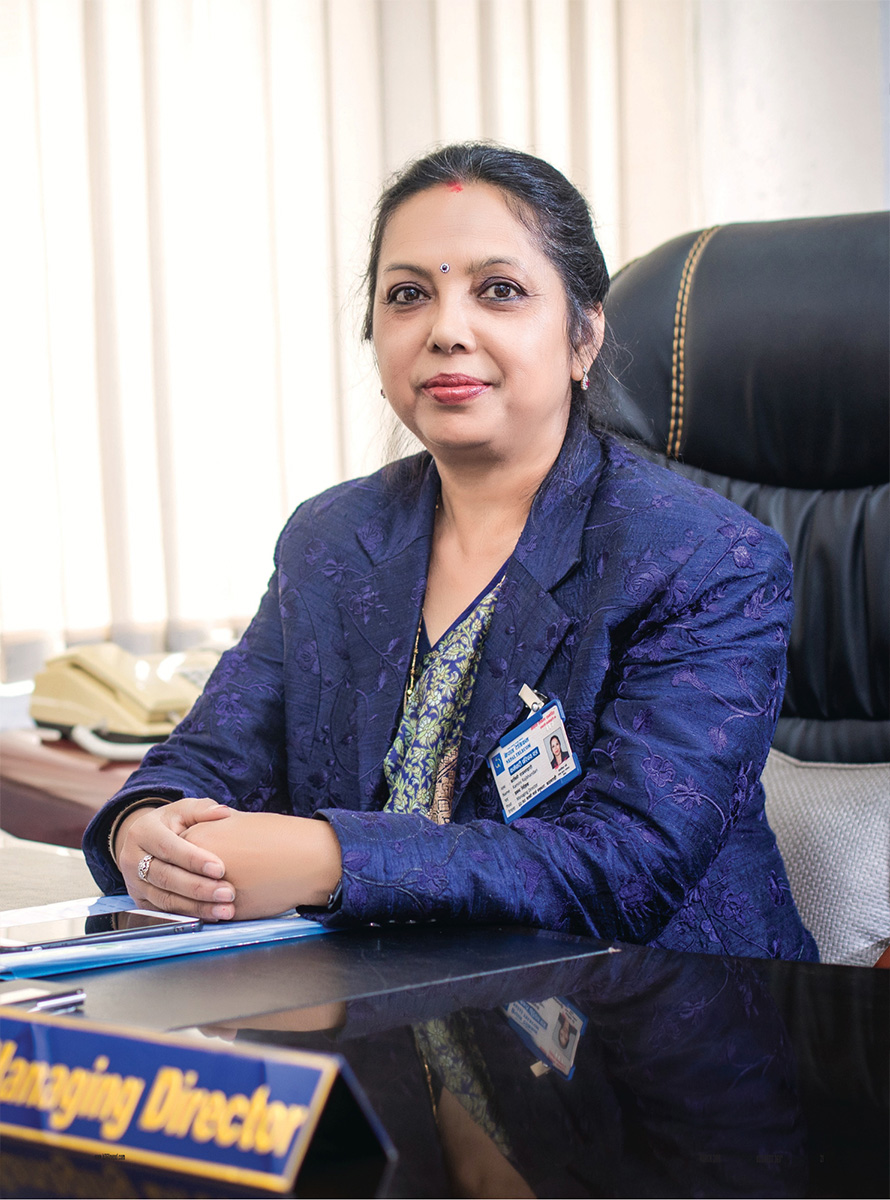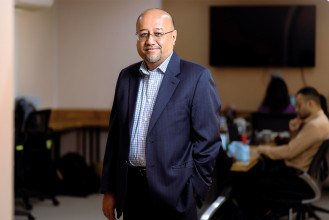
- by Sujan Tiwari
Kamini Rajbhandari is the Managing Director of Nepal Doorsanchar Company better recognised as Nepal Telecom, the nation’s first and largest telecommunication service provider with a history of more than a century. Rajbhandari has been associated with Nepal Telecom for the last three decades working in various capacities through her career. She has long and varied experience in areas of operation and maintenance, monitoring, troubleshooting, planning, specification preparation, project implementation and commissioning among others, and has worked in several departments of Nepal Telecom including Wireless Service Directorate, Wire-line Directorate, Planning Department, Operation and Maintenance Department. Rajbhandari joined Nepal Telecom in 1985 as an engineer after completing her Bachelors in Engineering in Electronics and Electrical Communications from Punjab Engineering College, India. She also holds a Masters degree in Business Administration (Management of Technology). Working her way to the top, she was appointed Managing Director in 2016, the highest management position of the company. She was awarded "Outstanding Woman Engineer of the Year - 2073" by Nepal Engineers' Association (NEA) and is the recipient of the “Outstanding Management Award -2017” by Management Association Nepal (MAN). In an interview with Business 350, Rajbhandari shares her experiences and accomplishments working with Nepal Telecom and also the future plans of the company. Excerpts:
You have worked with Nepal Telecom for the last 30 years. What has your journey been like and how has the telecom sector changed in these years?
It was a different time altogether when I joined. Engineers were in very high demand back then because there were so few of them. Back then, Nepal Telecom was only providing voice telephony service as that was the only available technology. But today, technology has evolved exponentially and Nepal has come a long way in providing telecommunication services. Today Nepal Telecom is providing PSTN service, GSM and CDMA mobile services and wired and wireless internet service throughout the nation. How difficult was it for a woman to achieve the topmost management position? I have achieved this position through years of continued hard work and dedication. I have worked in numerous departments of Nepal Telecom throughout my career. I never chose one department over the other; I worked and gathered experience from everywhere. I completed every responsibility that was given to me, no matter how difficult it was. My job placements and my promotions were all according to my capability. I had the opportunity to work in every new plan and service, and I always tried to learn new technologies. All that I have achieved is because of my own abilities. So I feel all my efforts bore fruit and now I am in this capacity.
What are the new developments in Nepal Telecom after you have become the Managing Director?
I have made a lot of new decisions during my term. A lot of these decisions are implemented and others are in the process of being implemented. I believe there should be always a vision... and an objective behind that vision. My first priority is our customers. They always come first for me. Out of the total population, 65.28% are our customers. This means that 66 people out of a hundred are using our services. If we look at data service, we have 31.66% customers and the numbers are growing. In FY 73/74, the net profit grew by 13.42% that translates into 15.37 billion rupees. The growth rate and revenue is commendable at present, and it will only grow further. During my tenure, Nepal Telecom started 4G services for the first time in Kathmandu and Pokhara in January 2017. Now we will expand 4G service across Nepal that will allow customers to enjoy high speed internet, good voice quality and coverage in even the remotest places. Global tender has already been published for this and evaluation is going on for procurement of GSM 4G-LTE Core and Radio Access Networks to provide VoLTE (Voice over LTE), ViLTE (Video over LTE) and data service. This will be the biggest achievement during my tenure. This is both a challenge and opportunity for me, and this plan will completely transform Nepal Telecom. During my tenure, an agreement was made with Nepal Telecommunications Authority to utilise Rural Telecom Development Fund (RTDF) for implementation of Mid-Hill Optical Fibre Network in Province 1, 2 and 3 and installation of free Wi-Fi network in earthquake affected districts Rasuwa, Sindhupalchok, Kavrepalanchowk and Nuwakot.  We have 4,169 employees, and I feel that our employees are our strength, and they should be inspired and motivated for us to face the competition. For my customers to be happy, my employees need to be happy . Towards this, I have initiated the result publication and posting of recruitment and promotion processes that were pending due to various reasons since FY 2067/68. During my tenure, under notices published for promotion, new recruitment and internal competition in FY 2073/74 and FY 2074/75, promotion and posting of FY 2073/74 has been completed, and the remaining results are under Public Service Commission processes. Another achieviement was conducting Nepal Telecom’s AGM of FY 2073/74 within the due date for the first time in the company’s history and the highest dividend declaration of 55% to our shareholders. And I have also started Due Diligence Audit of the company as a basic requirement of selection process for Strategic Partner for Nepal Telecom as per Government of Nepal’s decision. The most recent development during my term is the end of sole dependency on India for internet bandwidth. We have recently started internet bandwidth interconnection with China Telecom ending Indian monopoly. As Kathmandu-Rasuwa route is shorter, the latency is improved causing overall improvement in quality of provided internet. Another milestone is the completion of billing system migration of CDMA, GSM, ADSL and finally landline to the new CRTB and CS (Convergent Real Time Billing and Customer Support) system on January 18, 2018 and thereby enabling converged billing and customer support of NT's all major services. In addition, I have made various administrative changes to use resources more efficiently that will ultimately make Nepal Telecom more efficient and competitive.
We have 4,169 employees, and I feel that our employees are our strength, and they should be inspired and motivated for us to face the competition. For my customers to be happy, my employees need to be happy . Towards this, I have initiated the result publication and posting of recruitment and promotion processes that were pending due to various reasons since FY 2067/68. During my tenure, under notices published for promotion, new recruitment and internal competition in FY 2073/74 and FY 2074/75, promotion and posting of FY 2073/74 has been completed, and the remaining results are under Public Service Commission processes. Another achieviement was conducting Nepal Telecom’s AGM of FY 2073/74 within the due date for the first time in the company’s history and the highest dividend declaration of 55% to our shareholders. And I have also started Due Diligence Audit of the company as a basic requirement of selection process for Strategic Partner for Nepal Telecom as per Government of Nepal’s decision. The most recent development during my term is the end of sole dependency on India for internet bandwidth. We have recently started internet bandwidth interconnection with China Telecom ending Indian monopoly. As Kathmandu-Rasuwa route is shorter, the latency is improved causing overall improvement in quality of provided internet. Another milestone is the completion of billing system migration of CDMA, GSM, ADSL and finally landline to the new CRTB and CS (Convergent Real Time Billing and Customer Support) system on January 18, 2018 and thereby enabling converged billing and customer support of NT's all major services. In addition, I have made various administrative changes to use resources more efficiently that will ultimately make Nepal Telecom more efficient and competitive.
Are there other plans in your tenure?
As competition in the telecommunication sector is immense, we have to continuously come up with new innovations and services for our customers. So definitely there are plans. We will soon be starting Namaste Credit that will offer loan to pre-paid mobile users at the time they run out of balance at no service charge. We have around 800,000 PSTN customers. To benefit them with better technology, we are starting the transformation of legacy PSTN switch to IP-based IMS and NGN switches with access gateways that allows data service to 100% customers. This means that they will automatically receive internet service with their wired telephone. We will also soon be starting IPTV service for wired line users. We also have plans of opening ICT centres in all seven provinces.
What is the competition like with private telecom providers?
As we are state owned, we can’t be exactly compared with private providers. Profit is not our first priority. We are present in even the remotest places of Nepal, and we work to provide Nepalis with better telecommunication services. Time and again, we have provided free services to the people during calamities. We strictly adhere to norms and rules and regulations of the government. We are completely transparent. I think that the same should apply to all private operators, then the competition would be on equal footing.
 What are the strengths of Nepal Telecom?
What are the strengths of Nepal Telecom?
One of our strengths is PSTN connection as we are the sole provider of wired telephone service in Nepal. And we have one of the most qualified employees, and their knowledge and skills is our asset. We also perform timely technology transfer. We have an efficient framework that can adapt to any technological changes in the future. But the biggest strength of Nepal Telecom is the brand itself. We have a hundred year old history, and Nepali people have put their trust in us. This is our biggest strength.
How will the service of Nepal Telecom change with the recent political changes and state restructuring?
As we are state owned, we were prepared for this change from the start. We have formed a committee for expansion into all seven provinces. Our goal has always been to provide cost effective telecommunication services throughout the country and this will not change. There will be a few challenges, but we are well equipped to face them and we have started our work plans. We had five directorates in Kathmandu, Birgunj, Bhairahawa Nepalgunj and Dhangadhi. Now that structure will have to change and we are well prepared for it. I don’t think we need to add much infrastructure as we are really strong in that aspect. There could be some shifting of infrastructures though. So the state restructuring will not be a big challenge for us.
What is your message to aspiring women of the country?
In a country like Nepal, it’s quite a feat for a female to have acquired this position. But I did this through determination and handwork. I always saw challenges and hardships as opportunities. I am never afraid of challenges and I am always ready to face them. I would like to say that everyone should get good education and become skilled. It’s even more important for women. Women should not feel that their place is only within their families and households. They should come out and explore the world and explore themselves too. There is a challenge to balance professional and personal life, women should be able to that. My position comes with its own the problems too. I have made a lot of compromises in my personal life. I am in office for around 12 hours every day so I obviously miss out on a lot of personal time and social events and gatherings, but that is the compromise I have made. I feel that if I am more occupied with personal and social matters, it interferes with my work, and that impacts millions of people. I have prioritised my work as my single decision affects millions. Working women must find a balance between their personal and professional lives. As women constitute 51% of the population, they must come forward. This is crucial for the development of any country. I am waiting for the day when women will be on equal footing with men, and do not need reservation of any sort.





-1757917838.jpg)